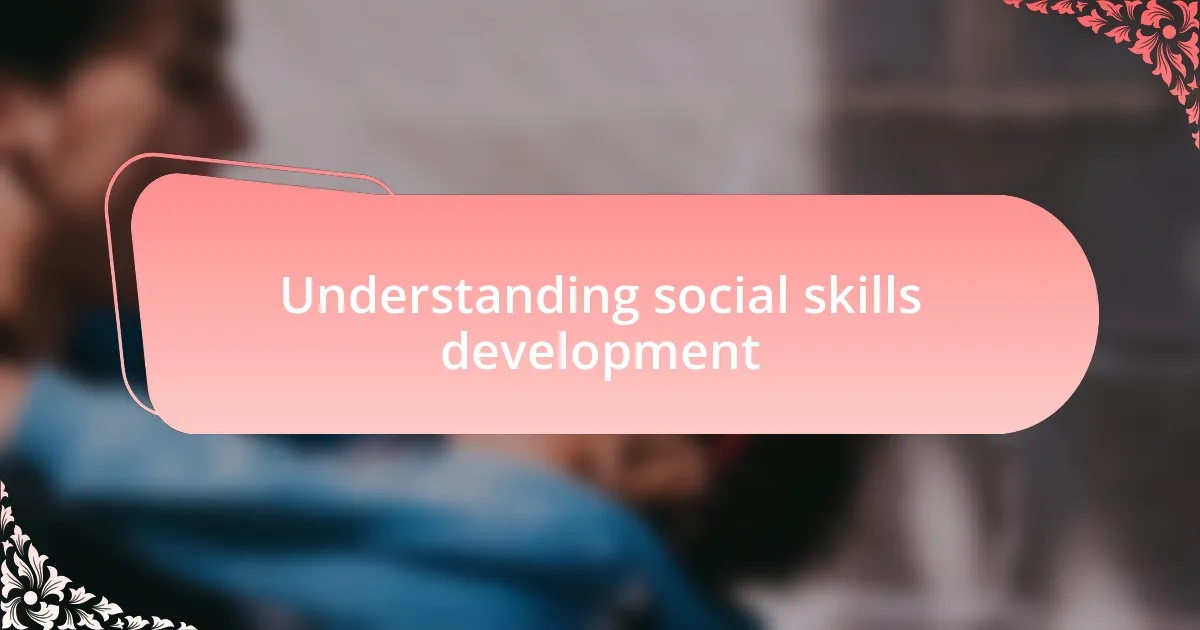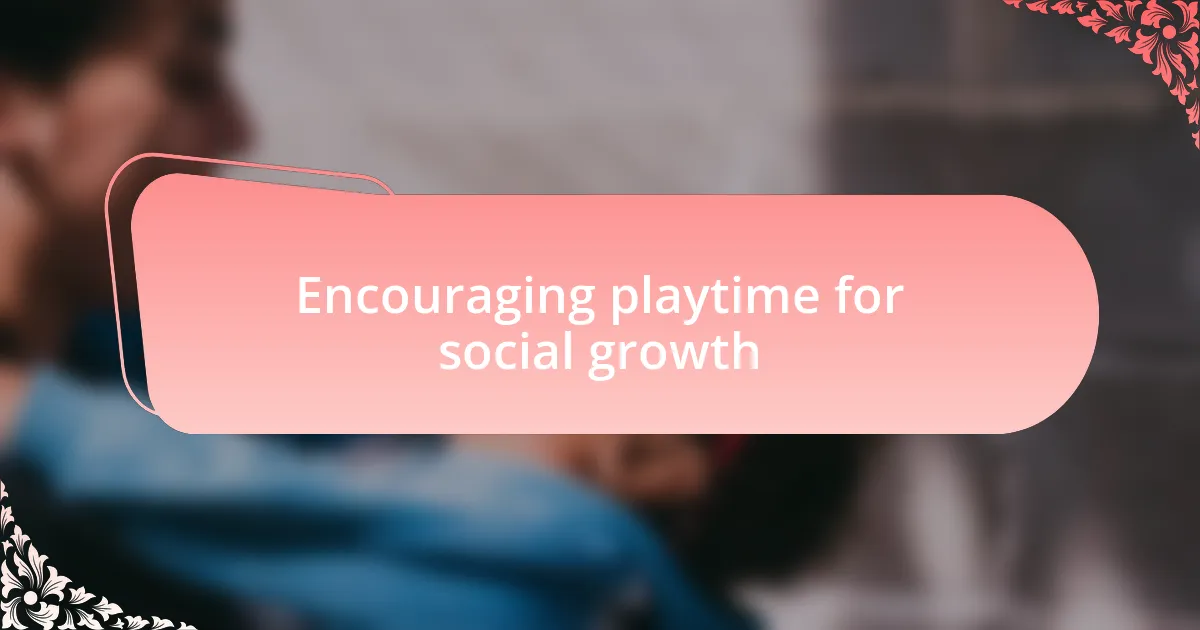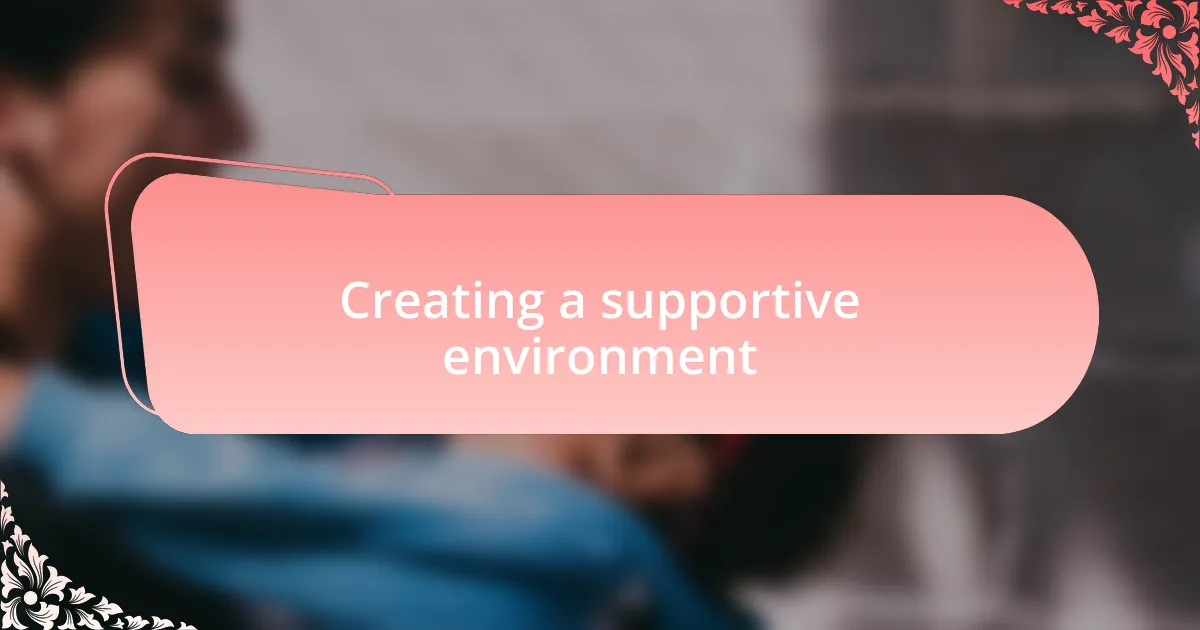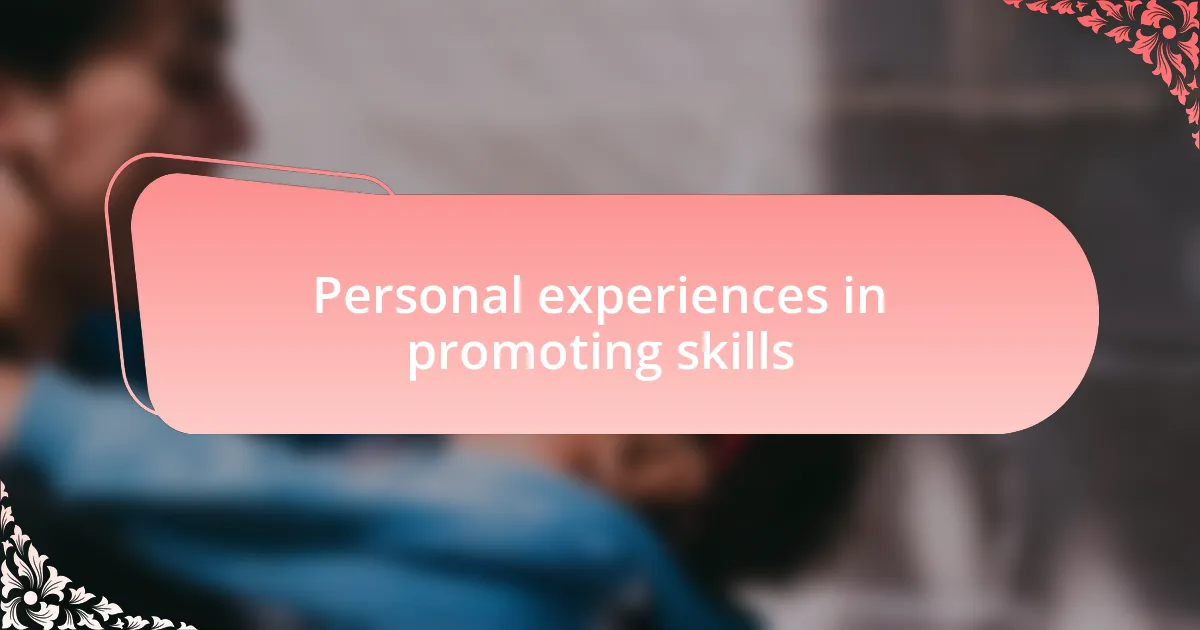Key takeaways:
- Children develop social skills through observation, practice, and relationships with peers and adults.
- Playtime, both structured and unstructured, serves as a critical platform for social growth, fostering teamwork and problem-solving.
- A supportive environment enhances emotional expression and community bonding, helping children build confidence in social settings.
- Personal experiences, such as sharing games and volunteering, play a crucial role in teaching empathy and inclusivity to children.

Understanding social skills development
Social skills development in children is a gradual process that typically begins in early childhood. I remember observing how my daughter would mimic her peers’ interactions on the playground, which showed me just how much kids learn through observation. Isn’t it fascinating how they pick up nuances, like tone and body language, simply by watching others?
As they grow, kids face various social scenarios that help them practice these skills, such as sharing toys or taking turns in games. I often find myself reflecting on moments at home when my son hesitated to join a group activity—his uncertainty made me realize how critical support is during these formative experiences. Have you noticed how even small victories in social interactions can boost a child’s confidence?
The role of relationships—both with adults and peers—cannot be overstated in this journey. I vividly recall a playdate where my child’s ability to express feelings reached a new level after a heartfelt conversation with a friend. What if we think of our support as scaffolding that helps children build their social networks? This ongoing development hinges on the encouragement they receive to communicate, collaborate, and empathize.

Encouraging playtime for social growth
Playtime is a vital avenue for children to refine their social skills. I recall a time when my children were engrossed in a game of tag at the park. As they chased and laughed, I saw firsthand how conflicts arose—someone got tagged unfairly or felt left out. But instead of stepping in immediately, I let them navigate these social hurdles. Those moments of resolving issues on their own not only nurtured their problem-solving skills but also deepened their friendships. Isn’t it amazing how play fosters both teamwork and individual resilience?
Structured playdates can also be beneficial in enhancing social growth. I once organized a themed activity day for my kids and their friends, complete with stations for games, arts, and storytelling. Watching the children collaborate on projects, negotiate rules, and celebrate each other’s successes filled me with joy. It highlighted the importance of guided interaction; I could see them forming bonds and memories that would last a lifetime. Have you thought about how such shared experiences can pave the way for deeper connections among peers?
Lastly, unstructured playtime offers children the freedom to express themselves creatively within social contexts. I remember my son once chose to build an elaborate fort with some neighborhood kids. They communicated their ideas, compromised on the design, and even worked through a mini-disagreement about who should be inside first. Observing them problem-solve in real-time was enlightening. These spontaneous moments allow children to discover their voice and develop empathy as they consider others’ feelings. Don’t you agree that such organic interactions are the bedrock of strong social skills?

Creating a supportive environment
Creating a supportive environment for children is essential for their social skill development. I vividly remember setting up a cozy reading nook for my kids and their friends, filled with colorful cushions and a variety of books. It became a haven where they could freely express their thoughts, sharing stories and opinions that sparked lively discussions. Have you ever noticed how sharing a story can unlock deeper connections among children?
In addition to creating physical spaces, emotional support plays a crucial role. One afternoon, I encouraged my daughter to voice her feelings after an argument with a friend. I witnessed how safe she felt to express her emotions, realizing that it was okay to be upset. This experience not only strengthened their bond but also taught her valuable lessons in emotional intelligence. Do you think children recognize the importance of sharing their feelings as a tool for building relationships?
Lastly, fostering a sense of community can elevate children’s confidence in social settings. I often hosted neighborhood gatherings where kids of all ages participated in various activities. Watching my son introduce himself to new friends filled me with pride; he was stepping outside his comfort zone. Such environments cultivate not just friendships but also instill a sense of belonging. Isn’t it rewarding to see children flourish in a supportive atmosphere?

Personal experiences in promoting skills
One of my most memorable experiences in promoting social skills happened during a weekend playdate. I noticed my kids were hesitant to share their toys with their friends. To address this, I organized a fun game where sharing was essential to winning. It was amazing to see the transformation; not only did they learn to share, but they also started engaging in collaborative play. Have you ever observed how teamwork can quickly shift the dynamics among children?
I remember a time when my son struggled to include a quieter friend in their games. Instead of stepping in immediately, I asked him how he could make his friend feel welcome. Watching him take that initiative not only deepened his empathy but also reminded me how pivotal it is for kids to learn inclusivity through personal effort. Reflecting on this, it’s fascinating how children’s perspectives shift when given the chance to think for themselves, isn’t it?
Another striking moment came during a family outing where we volunteered at a local shelter. I saw my daughter interact with people from different backgrounds, asking questions and genuinely listening. It was a revelation for her, breaking down barriers she didn’t even know existed. This experience taught me that real-world interactions often provide the most profound lessons in social skills—as grown-ups, don’t we all find value in connecting with diverse perspectives?